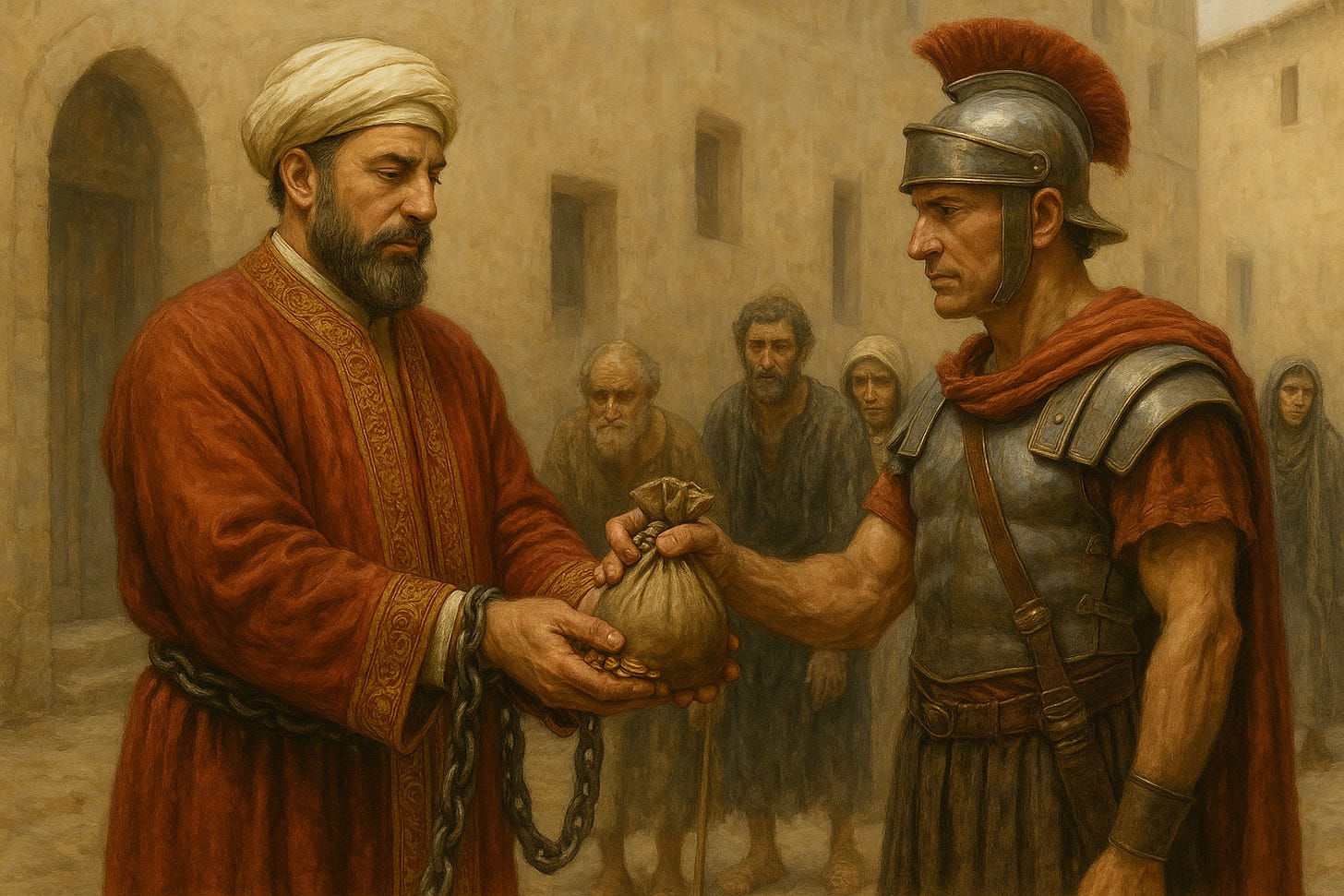A person’s riches may ransom their life
Proverbs 13:8 - Whatever Solomon’s intent is, this proverb is a reminder to have spiritual treasures stored up as even the wealthiest cannot buy their way out of all troubles.
Image generated by ChatGPT (OpenAI) using the DALL·E model.
“A person’s riches may ransom their life, but the poor cannot respond to threatening rebukes.”
Proverbs 13:8 NIV
There are many ways that we as humans can measure the worth of our lives; our kindness to others, our commitment to God and His commandments, our love for family and friends, the legacy of our advice and help to others. Another way to measure personal worth is our riches — the sum total of our work, investments, possessions and inheritances.
When Solomon wrote this proverb, he began by pointing out that a person’s riches can very well be used to “ransom” his or her life. What does this word really mean? The original Hebrew word was כֹּפֶר (kōp̄er), which can be defined as “ransom” but also has the meaning of “the price of a life”.
A rather common movie or TV plot device dealing with ransom has a person in a family being kidnapped, with the kidnappers demanding a payment — the ransom — to release the kidnapped person alive. That’s what “the price of a life” means. In this unlikely sort of crisis situation, the riches accrued by a person may very well ransom his or her life. Another example — perhaps a health situation arises, and you’re able to use your riches to get the best treatment possible and extend your life — that’s also an example of a person’s riches ransoming their life.
There’s an example in Jeremiah 41:8 where the promise of a ransom saves the lives of ten men: “But ten of them said to Ishmael, “Don’t kill us! We have wheat and barley, olive oil and honey, hidden in a field.” So he let them alone and did not kill them with the others.”
In this respect, it was (and still is) preferable in life to have some riches saved up, whether those be of the physical or spiritual type (see Matthew 6:20 for a description from Jesus of spiritual riches).
19th century preacher and theologian Charles Bridges wrote this about ransom and riches in his commentary on Proverbs:
“But what can a person give in exchange for his soul (Matthew 16:26)? It is too precious to be redeemed with corruptible silver and gold (1 Peter 1:18-19). When all the treasures of earth were insufficient for this ransom, the riches of heaven were poured out (Hebrews 10:5-8).”1
Without looking at the biblical references in Bridges’ commentary, you can guess what he’s talking about here: the ransom for our sin being paid for by Christ’s blood, our eternal life being bought by His death on the cross.
The second half of this proverb is a bit more complex. We’re seeing in the first part that wealth has advantages in that those riches can help ransom a life in many ways. On the other hand, the poor may never find themselves in the same dire straits as a rich person and need to ransom their life — who would want to kidnap a poor person?
G. Campbell Morgan said it this way in a commentary cited on Enduring Word:
“That is to say that if wealth has its advantages, so also has poverty. The rich man by his wealth may be able to conserve his life, but the poor man escapes the very dangers into which the rich are brought.”
and in his commentary, Adam Clarke explained:
“Those who have riches have often much trouble with them; as they had much trouble to get them, so they have much trouble to keep them. In despotic countries, a rich man is often accused of some capital crime, and to save his life, though he may be quite innocent, is obliged to give up his riches; but the poor, in such countries, are put to no trouble.”2
In Proverbs, Solomon’s goal was to instill wisdom — that’s why this book is referred to as “Wisdom Literature”. In a more negative sense, perhaps Solomon was saying that those who were living in poverty were in that state because of their own moral failings. That’s most certainly not the case for most poor; they’re in the condition of poverty for reasons other than their unwillingness to hear, understand, and act upon stern advice given by others. But for some, foolishly rejecting the wisdom (“rebukes”) of others is the reason for their poverty.
Whatever Solomon’s intent is, this proverb is a reminder to have spiritual treasures stored up as even the wealthiest cannot buy their way out of all troubles.
Heaven On Wheels Daily Prayer:
Heavenly Father, thank You for teaching me that true worth is not found in earthly riches, but in the treasures of the spirit. Grant me wisdom to value righteousness over wealth, generosity over gain, and contentment in Your provision. Fill my heart with compassion for those in need, and help me to store up spiritual riches that can never be lost. In Jesus’ name, AMEN.
Scripture quotations taken from THE HOLY BIBLE, NEW INTERNATIONAL VERSION®, NIV®. Copyright © 1973, 1978, 1984, 2011 by Biblica US, Inc.®. Used by permission.
Commentary quotations from Enduring Word are used with the written permission of the author
Bridges, Charles “Proverbs” (The Crossway Classic Commentaries) (Wheaton, Illinois: Crossway Books, 2001 edition of 1846 original)
Clarke, Adam “Clarke’s Commentary: The Holy Bible Containing the Old and New Testaments with a Commentary and Critical Notes” Volume 3 (Job-Song of Solomon) (New York: Eaton and Mains, 1827)



